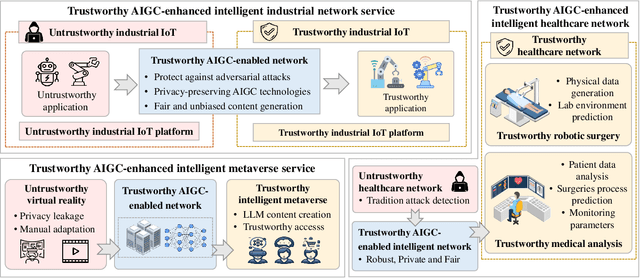Yaju Liu
OpticGAI: Generative AI-aided Deep Reinforcement Learning for Optical Networks Optimization
Jun 22, 2024



Abstract:Deep Reinforcement Learning (DRL) is regarded as a promising tool for optical network optimization. However, the flexibility and efficiency of current DRL-based solutions for optical network optimization require further improvement. Currently, generative models have showcased their significant performance advantages across various domains. In this paper, we introduce OpticGAI, the AI-generated policy design paradigm for optical networks. In detail, it is implemented as a novel DRL framework that utilizes generative models to learn the optimal policy network. Furthermore, we assess the performance of OpticGAI on two NP-hard optical network problems, Routing and Wavelength Assignment (RWA) and dynamic Routing, Modulation, and Spectrum Allocation (RMSA), to show the feasibility of the AI-generated policy paradigm. Simulation results have shown that OpticGAI achieves the highest reward and the lowest blocking rate of both RWA and RMSA problems. OpticGAI poses a promising direction for future research on generative AI-enhanced flexible optical network optimization.
Trustworthy AI-Generative Content in Intelligent 6G Network: Adversarial, Privacy, and Fairness
May 09, 2024



Abstract:AI-generated content (AIGC) models, represented by large language models (LLM), have brought revolutionary changes to the content generation fields. The high-speed and extensive 6G technology is an ideal platform for providing powerful AIGC mobile service applications, while future 6G mobile networks also need to support intelligent and personalized mobile generation services. However, the significant ethical and security issues of current AIGC models, such as adversarial attacks, privacy, and fairness, greatly affect the credibility of 6G intelligent networks, especially in ensuring secure, private, and fair AIGC applications. In this paper, we propose TrustGAIN, a novel paradigm for trustworthy AIGC in 6G networks, to ensure trustworthy large-scale AIGC services in future 6G networks. We first discuss the adversarial attacks and privacy threats faced by AIGC systems in 6G networks, as well as the corresponding protection issues. Subsequently, we emphasize the importance of ensuring the unbiasedness and fairness of the mobile generative service in future intelligent networks. In particular, we conduct a use case to demonstrate that TrustGAIN can effectively guide the resistance against malicious or generated false information. We believe that TrustGAIN is a necessary paradigm for intelligent and trustworthy 6G networks to support AIGC services, ensuring the security, privacy, and fairness of AIGC network services.
 Add to Chrome
Add to Chrome Add to Firefox
Add to Firefox Add to Edge
Add to Edge